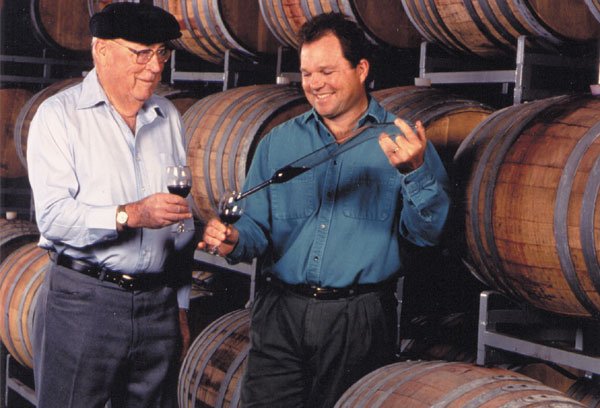Charlie Wagner bought acreage near Rutherford in 1941. On his
new 73-acre property, he and his wife Lorna planted grapes and
began making wine. As the years passed, they gained a reputation as
skilled vintners and winemakers.
Charlie Wagner bought acreage near Rutherford in 1941. On his new 73-acre property, he and his wife Lorna planted grapes and began making wine. As the years passed, they gained a reputation as skilled vintners and winemakers. In the 1960s, they planted the first of the Cabernet Sauvignon vines that would produce the wines that would put the Wagner family on the world wine map.
There weren’t a lot of people making wine in Napa at the time, and those who were hadn’t really found their market yet. That would happen later, when winemakers like Robert Mondavi fused expert winemaking with professional marketing and shameless self-promotion.
In the 1960s, there were no famous California winemakers (unless you count Ernest and Julio Gallo), and most Americans thought of wine as being strictly for “special occasions” like Sunday dinner, Christmas and New Year’s eve. There were very few national brands, and not many of those were of a particularly high quality.
There were some, however, who had a dedication to producing wines on par with the ones made in Europe, particularly France. Among those quality-minded winemakers were the Wagners.
When Charlie planted those Cabernet vines in the early part of the decade, he also put in Pinot Noir and Johannesberg Riesling. In 1972, Charlie, his wife Lorna Belle Glos Wagner and their son Chuck founded Caymus Vineyards. The name was taken from “Rancho Caymus,” the title of the Mexican land grant that encompassed their land.
Rancho Caymus was granted to Richard Yount in 1836. It included what is now the town of Rutherford and a lot of the surrounding area.
Imagine what that chunk of land would be worth today: If you owned that parcel, you could afford to regularly drink the expensive wines produced on it. The word “Caymus” came from the name of a group of Native American Mishewal-Wappo who lived near present-day Yountville.
The Wagner’s first year production included 240 cases of Cabernet Sauvignon, the wine for which Caymus would eventually become famous.
Caymus Cabernet Sauvignon is one of California’s most lauded wines. The winery was awarded Wine Spectator’s Wine of the Year Award not once but twice, in 1989 and 1994 for its Special Selection Cabs. That magazine also proclaimed – in an issue that featured the family patriarch, Charlie, on the cover – that Caymus is “The best damn Cabernet in California.”
But Caymus isn’t strictly about Cabernet. The label has also been affixed to some outstanding Zinfandels and Sauvignon Blancs. And in the last few years, the family has expanded the business by adding new labels. One is Belle Glos, named after Lorna Belle Glos, the elder Charlie’s wife and matriarch of the Wagner wine family.
Also in production is Mer Soleil. As mentioned in last week’s column, Mer Soleil Chardonnay is grown in Monterey County, and the wine is being made by a member of the third generation of Wagner winemakers, young Charlie.
This brings me back to Charlie’s dad, Chuck. (With all those Charlies and Chucks running around, the Wagner household must have been an interesting place.) When he and I set out in his Mercedes G-class SUV to drive around the Mer Soleil vineyards a couple of years ago, my impression was that he was just another of those guys who made a boatload of money in high tech and decided to start a vanity winery. The type of guy who hires people to make wine to impress his friends and is fond of spouting clichés like “in the wine business, it takes a big fortune to make a small one.”
Boy, was I wrong about Chuck. Turns out he is truly a man of the earth. A humble guy who can expound for hours about terroir. About how grapes from the exact same vines growing on different sides of the same hill can display radically different flavors.
A guy who walks through his vineyard, picks out a plant from a weed patch, gives it a sniff and says “smells just like pineapple.” And it does. What Chuck really is, I finally realized, is a farmer. And his Mercedes G-class SUV is covered in mud, the main tool of his trade.
Chuck’s son Charlie II is one of those lucky few who know from a very young age exactly what it is they are going to do in life. I suppose that in a family business there could be a certain amount of pressure to take over where dear old dad left off.
Some would rebel and join the circus or a rock-and-roll band, but in Charlie’s case, one gets the impression that he can’t wait to get going. He’s got a great start.













